#Holy shit this is probably tangent-y and disorganized as hell but here's my insane ramblings for the month
Text
My personal thoughts on the major themes of Penacony 2.2
I was gonna make an entire Penacony retrospective and try to really dig into the whole story, but 1. I'm not that smart and 2. It has hours of footage and I don't think I'm strong enough to parse through that and form my own conclusions
so, just the things that really jumped at me and made me pause to think. I may do surface level research to make sure if a character really said this or that, but other than that, these are my thoughts fresh after finishing the quest.
Ok, to start off: Sunday and the road to hell
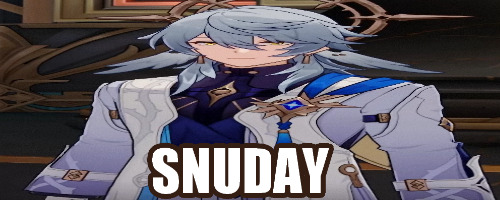
He's... god, he's such a complicated and interesting little man.
He is what I would call the embodiment of the saying "the road to hell is paved with good intentions". On the surface, he is trying to make a universe which is authoritarian-like. If you peel it back a bit more, he intends to make the universe a better place. But at the heart of it, I think he's just someone who is scared of pain.
There are 3 sequences I want to break down:
The Robin-Sunday exchanges before they meet Gopher Wood
This exchange has a lot of Sunday misdirecting Robin's points, but she calls out most of it.
Robin starts off with observing the dreamscape and concludes that dreamchasers shouldn't use penacony as a means of escaping entirely from reality. Because they won't overcome their demons. She asks if this can really count as "living"
Sunday at first seems to agree that things are not the way it should be. But there's a bit of misdirection on his part. He responded to robin's question by connecting "people using penacony as an escape" with (his opinion on) the way people currently "live" (which is what he was agreeing to in "things are not the way it should be"). He will then frame the narrative to show that people completely escaping through dreams is a good thing, and then will swerve to say how the "strong" should determine the future of the "weak".
Robin understandably does not agree with Sunday's narrative, because she believes that by staying in the dream (or MAKING dreamchasers stay in the dream), it will lock dreamchasers in stasis forever, making them unable to choose how to go about their future and overcome their difficulties. She then criticizes that no one has the right to determine whether a human deserves to live for a future or not.
There's a clear difference in ideology here. Sunday's devotion to Order is so strong because the experiences in his life had led him to believe that forcing his will on other people is the way to go. His ideology is rigid, cold, impersonal and is applied to all uniformly.
Robin firmly believes in choice and refuses to let an authority govern the way people should live. She wishes to unite people through her singing, and to inspire people to live. Her ideology is more personal, uniquely applied, and is idealistic and romantic.
2. The quiz sequence
An interesting thing about this sequence is the first two questions have quite reasonable answers. At the start of it, at least.
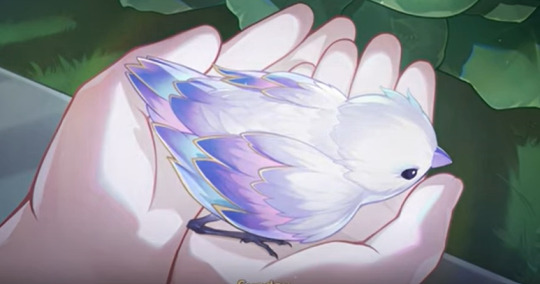
The first question is about nurturing and letting go. I think why most of the girls agreed to put the bird in a cage is because to do something great, you must first be equipped to survive. Maslow's bottom hierarchy, if you will. i think Sunday realizes this too, and puts it into some of his points to justify making decisions on behalf of other people.
"We must teach the weak how to live a happy life"
Though, the problem is that he twists this point so much and wants to force this on everyone. This is seen when he puts everyone on Penacony in Ena's dream. This disregard for other people's input kinda reflects how he sees the bird, in a way. The bird is something below Sunday, it cannot object his actions because it is merely just a weak, injured little thing.
It is here that he experienced pain of futility. The pain of putting in effort into something but have it crash and burn in the end no matter what. Afraid of that pain, he wonders if birds are meant for the sky if some fall before they can reach it. He has a very black and white mindset about this.
Either all birds fly and deserve the sky, or if even one bird falls then no birds deserve the sky.
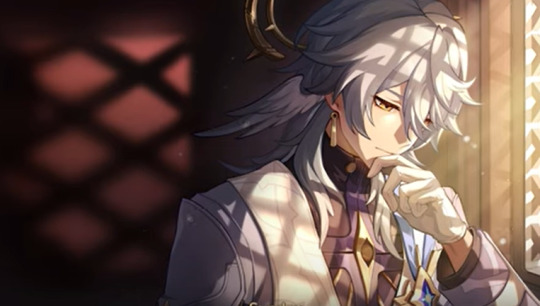
The second question is about a person who is being pursued by the bloodhounds. Sunday is in a position of power, and has the influence to pardon the man. As a result, the man got away, forgot about his children, and hurt the people working under him in penacony.
Though, it's worth to mention that I think it's also partly the fault of the Oak family, who didn't try to discourage dreamchasers trying to find answers or solve their personal problems in Penacony. But I believe that's intentional.
Anyways, the crux of the question, if Sunday had known the outcome of his decision from the start and he had the foresight to think that Penacony isn't a place to search for answers, I actually think upholding the law would be the best course of action here.
I think this is where he developped his fear of... consequence. Because humanity has free will, they may use his pardon from the law to do awful things. This might be why he values upholding the law so much.
Another thing to note, I think Sunday hasn't gone off too far into the deep end at this point of his life. In a previous sequence with the same scenario, he actually questions what devotion to the Order would be like, and his doubts on its way of life.
"Who can judge the strong when their power hides their crimes?"
"Who can vouch for the weak when they will pay any price to survive?"
"Who can comfort the purest souls when even they get led astray?"
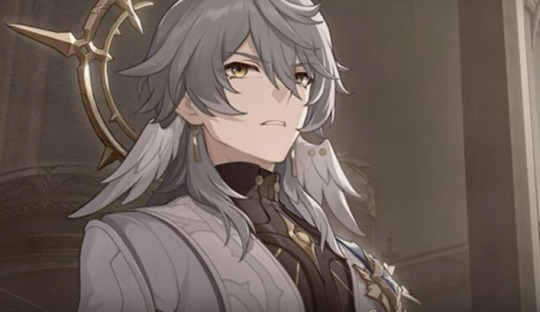
It's important to note that Sunday is in a position of power and emphasizes knowing the outcome of the first two questions.
The third question is the only question where he and the other party were of near equal standing. It's where he still hasn't made a decision, and which the outcome has not yet been decided.
Sunday cares about Robin's input and feelings. He cares so much he doesn't have it in him to force her to stay for the Order.
I think this is the crack in his belief of the Order. Because he cannot stop her from trying to fly. Because he cannot apply his law indiscriminately. Because it's Robin. His sister.
He has not made a choice, and Robin has not met her end yet like he's feared.
But he's so afraid of the pain of losing her. He's so afraid it haunts him in his nightmares.
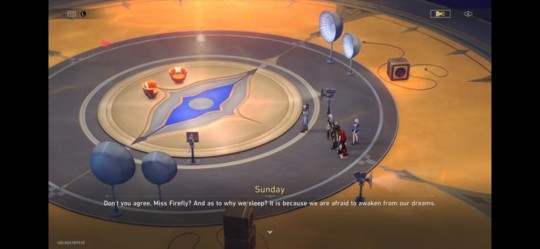
After presenting the quiz, he essentially asks the main question of penacony: "Why does life slumber?"
He answers, "Because we are afraid to awaken from our dreams."
Interestingly, this is identical to Firefly's conclusion in 2.0. The difference is, Sunday thinks his answer is universal and will force his solution on everyone, while Firefly's is just her own personal answer.
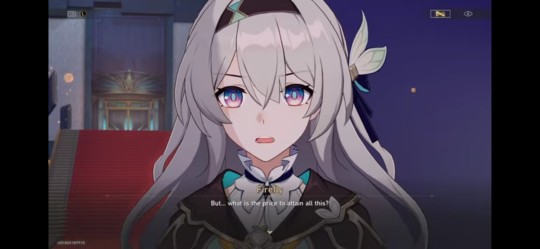
Firefly asks what the price for Sunday's paradise is, and that made me stand up and point at the screen in agreement. Because what Sunday's aiming for is an authoritarian universe.
When an authority reigns supreme that it forces its will onto unwilling citizens, all in the name of the ideal society. That's a dystopia.
As Sunday said before, who will keep the authority in check? Who can ensure that the authority will not abuse their power?
That's what's so dangerous about an authoritarian government. You can't take the risk when it comes to this. You can't just give the power to one person, no matter how righteous or nice they seem. Because like the saying goes, give them an inch and they will take a mile. You cannot afford to cross the line, because when you do, who knows how far they'll take it.
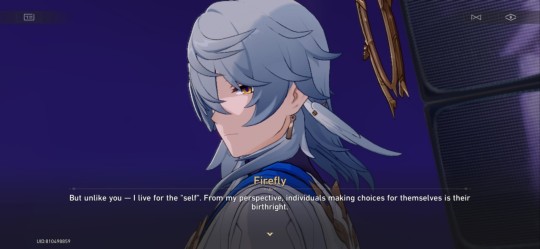
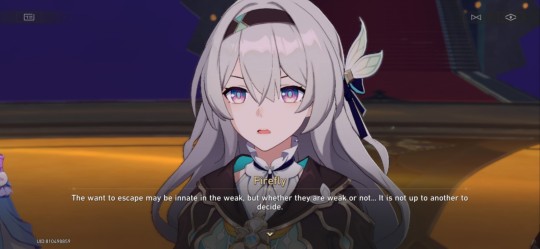
Sunday clearly sees Firefly as someone weak, kind of akin to the bird in his childhood who needs his "saving". But Firefly does not appreciate someone deciding on her behalf whether she's weak or needs saving.
3. Ode to Order
I think it's important to note Sunday really frames Ode to Order in this angelic and holy way. Hell, the music even reflects this with a more bright and heavenly choir.
"Requiem aeternam" is a prayer for souls to reach heaven, eternal rest.
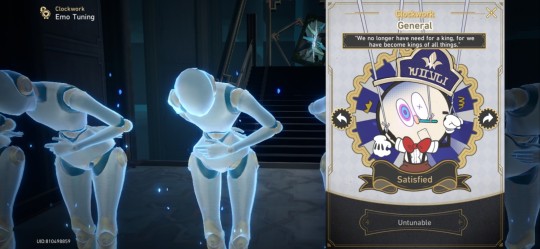
(A bit of a tangent, but when I saw this in the game I SHIVERED so hard. This is such creative story telling aughh- Like, using previously established game mechanics and twisting them to become something horrifying is SO COOL. What a delightfully terrifying way to illustrate what Sunday aims to achieve.)
This illustrates Sunday's paradise as a place where everyone is forcefully "tuned" to become a certain way forever. To be manipulated with Ena's strings without their consent like puppets into a picture perfect scene.
Though, I was confused why Sunday framed this ideal society as people abandoning the need for an authority, when it was something he was pushing so hard in previous sequences.
But my interpretation is that he will spread this message, of everyone being of equal standing, but leave himself as the true leader that will stay awake to ensure everyone else is blissfully asleep.
This really ties everything together for me. Sunday is someone so self righteous but self sacrificial that he's willing to put himself high in the sky, and be aware that he will be completely alone up there.
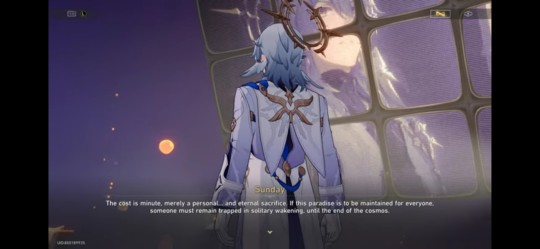
He is afraid of pain, and will do everything to avoid experiencing it ever again.
After experiencing pain, we shouldn't be scared of it. Sure, we can escape a bit to get some reprieve, but we must tend to our wounds so that we may not only survive, but live.
That brings me to the second major theme of Penacony : Nihility, and the feeling of futility
I will be breaking down Acheron's character first.
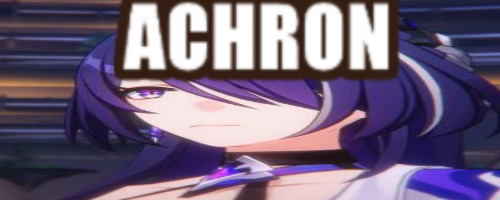
Self annihilators/Nihility emanators are so interesting, they are beings that slowly are losing themselves thanks to their own powers of Nihility. A predetermined end.
Living for so long + Nihility actively chipping away at her being is sure to make her memories blend in together. This is why Acheron values emotions so much, because it is one of the only anchors she can use to avoid succumbing to Nihility.
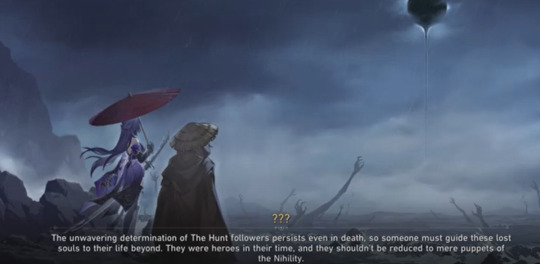
Her flashbacks with Tiernan are beautifully melancholic. Their exchange starts with Acheron pondering if the task Tiernan is doing is pointless, and if he should even bother? And if the end is expected, then should they change it? It's a bit muddy, but I interpret that here, Acheron is still searching for the meaning of Nihility, and Tiernan is the person who guides the souls to the other side of the river at that time.

In the next scene, Acheron states she's holding on to whatever she can to avoid succumbing to Nihility. She had journeyed with a Nameless girl once, who wanted to explore IX. But as expected, the girl ceased to be, but left with a smile. Acheron is scared of forgetting her memories with that girl.
The only other anchor she knows is of her promise to bring more warmth to other people, to a more hopeful future where she will cut off Nihility. She associates that promise and hope with the color of red.
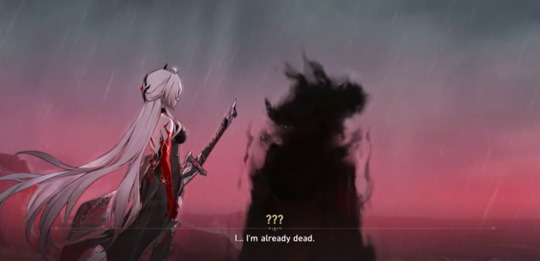
The next scene mirrors the first scene. I interpret it as Acheron having found the meaning of Nihility, sorta embracing it, and is now guiding others to advance towards and depart the Nihility, with Tiernan having forgotten himself.
When Tiernan asks if what Acheron does is pointless, she gave the same answer Tiernan gave her, because some things have to be done. And she's come this far without needing a point, so why should she search for one?


"May death be the end of your boundless dream... guiding you back to the waking world."
I still cannot decipher the meaning of this statement completely. As far as I know, it's said 2 times. The first is after Firefly "died", and the second is in the above exchange with Tiernan.
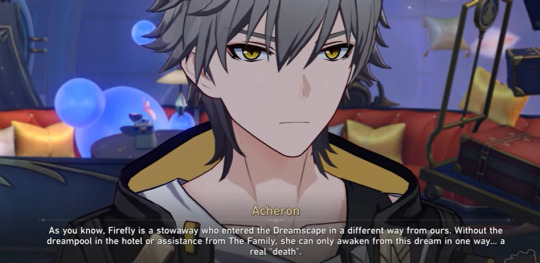
In Firefly's case, perhaps the "death" refers to waking up from Ena's dream at the beginning, "boundless dream" is Ena's dream, and "the waking world" is Dreamflux Reef/reality.
In Tiernan's case, I can assume the "boundless dream" is his eternal unrest, as he's still lingering in the dead sea, not yet ready to enter the abyss of Nihility. The "death" may be referring to him entering the abyss, while the "waking world" is existence, as he finds his way out of Nihility.
To bring this all together, I think Acheron in this case represents and goes against Nihility. She presents Nihility as something inevitable and predetermined (death), something that awaits everyone, and something that everyone will have to embrace at some point of their lifespan (boundless dream).
But she also believes that one shouldn't wholeheartedly embrace Nihility. in the face of Nihility, we must do everything to take in the world around us and remember what makes us exist. She believes there is a way out of Nihility, and that is existence. (waking world)
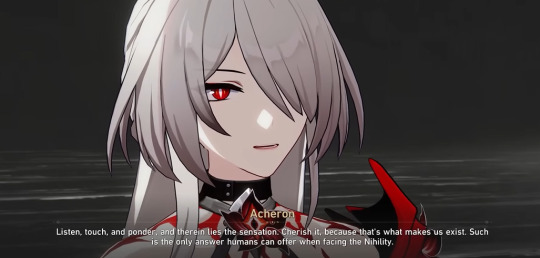
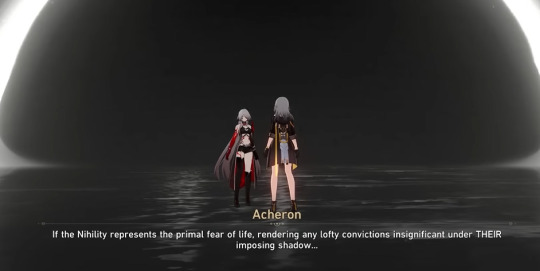
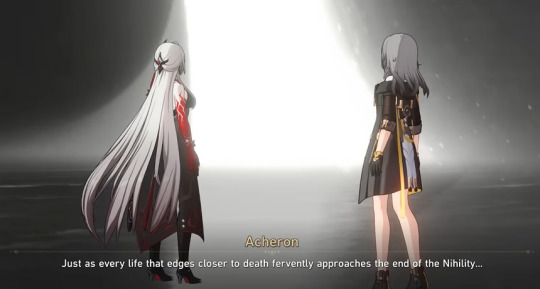
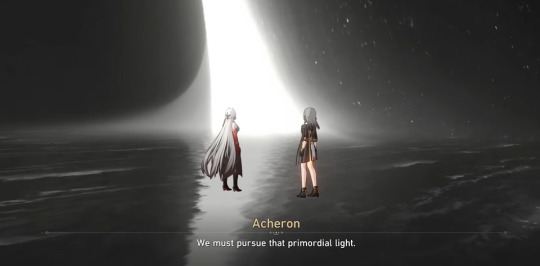
In the face of futility, if everything really did have a predetermined end, I believe we should still try to make choices. Despite it being "pointless", I think that's what gives meaning to our existence. Otherwise, we risk succumbing to Nihility.
That's why when the trailblazer finally uttered their own choices, I felt shivers. One, because this shows the development of TB's character, and two because TB will do what they have to, they will never be content living in a dream, and they choose to continue in the face of "futility", despite the ending of their journey being predetermined.
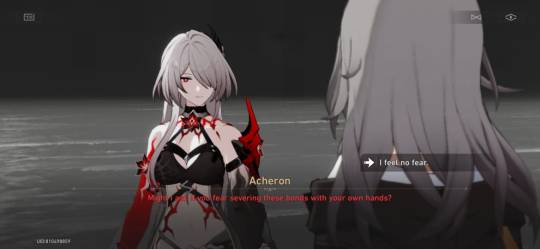
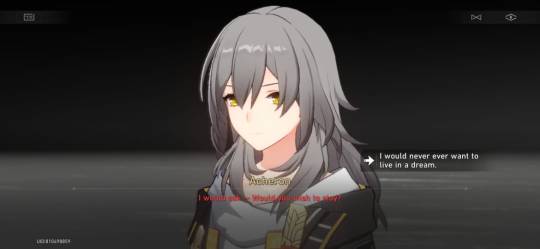
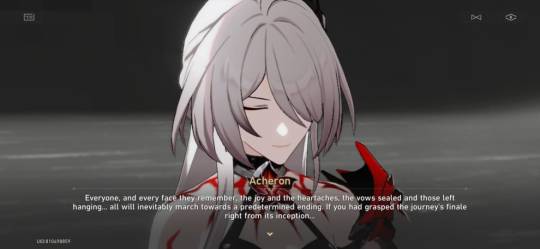
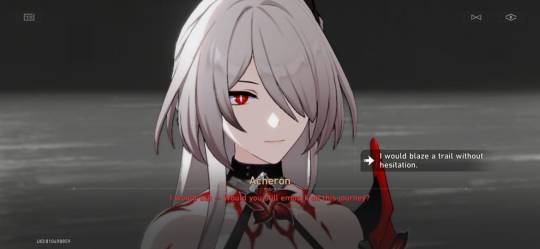
In the face of futility, Sunday chooses to eliminate pain and choice out of the equation, only choosing to create a universe that's stuck in a mindless, blissful stasis. Because he is anticipating pain.
But sometimes, the anticipation is worse than the actual pain itself. He is also eliminating the element of choice, with the assumption that people will not be able to survive when they are facing futility.
But, Acheron's words really struck me.
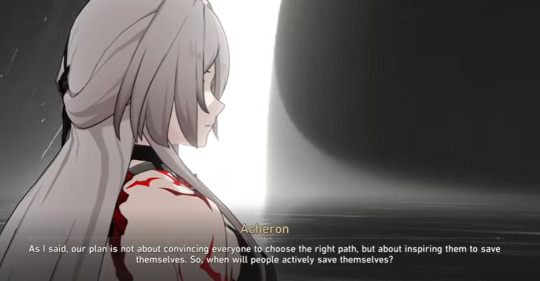
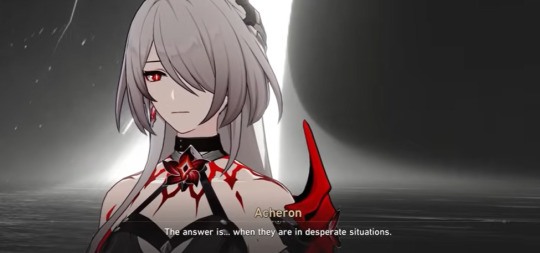
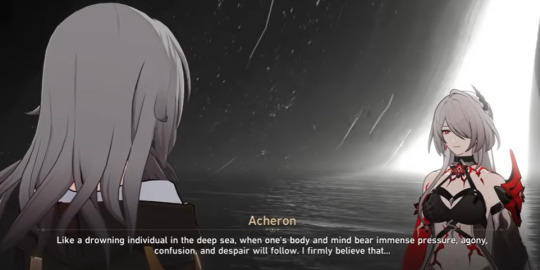
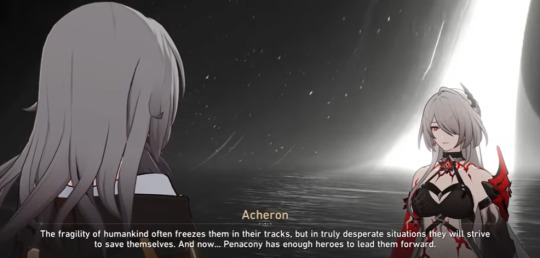
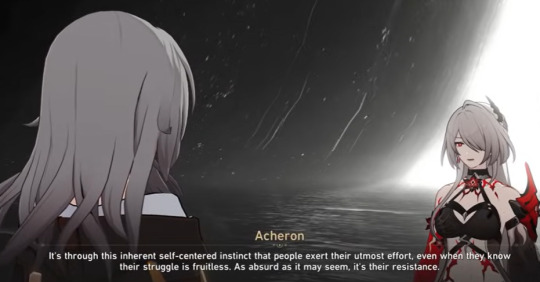
In the face of futility, pain, and pressure humans may freeze in fear. But that innate survival instinct in humans might push them to fight and claw themselves out to save themselves. By removing the choice to fight for their lives, they won't have the choice to fight off Nihility.
To end this, I would like to go back to main question of Penacony
"Why does life slumber?"
And I think TB answers this beautifully.
"Because we will wake from our dreams."
Life slumbers to find reprieve from the harsh reality. But slumbering does not give us the solution to our problems, only recharging us to prepare for the waking world once more. And in the waking world, even if what we do is futile, we still have a choice in how we want to reach for the end.
#Fruit talks#Holy shit this is probably tangent-y and disorganized as hell but here's my insane ramblings for the month#Idk if this made sense but these are the things that made me feel strongly in 2.2#I may have missed some points but feel free to shout at me in the comments or reblogs
50 notes
·
View notes